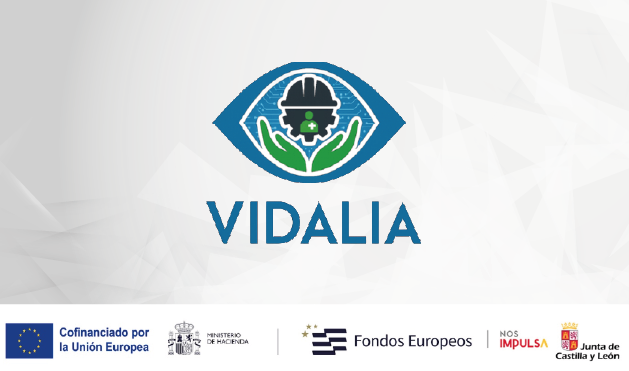VIDALIA: Research on an Innovative Computer Vision System for Preventing Occupational Risks and Monitoring the Wellbeing of Dependent Older Adults in Industrial and Social-Healthcare Environments
The industrial and healthcare sectors need to fully harness the potential of Computer Vision, Artificial Intelligence and real-time monitoring systems to ensure people’s safety and wellbeing, as well as to swiftly and efficiently identify and prevent risk situations.
In this context, the project aims to research an innovative real-time monitoring system based on cameras and other sensors, capable of identifying risk situations and ensuring the safety of individuals in industrial and social-healthcare environments, using technologies based on computer vision and artificial intelligence. Research will focus on the automatic detection of conditions that may pose a danger to people’s safety and wellbeing, such as the absence of personal protective equipment, unsafe behaviours or falls, among other scenarios.
At present, in the industrial equipment and social-healthcare sectors, risk prevention and monitoring methods rely mainly on human observation. The project seeks to improve people’s safety and wellbeing, as current human-based supervision methods have certain limitations, such as the need for staff or the lack of speed in responding to problems.
In this scenario, VIDALIA introduces an innovative approach that combines cameras, sensors and real-time data analysis to enhance safety both in industrial environments and in the healthcare sector. Its main objective is to develop an innovative monitoring system capable of detecting situations that may compromise the safety or health of workers and/or patients, such as the absence of personal protective equipment, unsafe behaviour, falls or unexpected incidents, among other high-risk scenarios.

The VIDALIA project is focused on helping companies provide future tools and services to support people’s wellbeing by researching innovative and cutting-edge technologies. This initiative centres its efforts on computer vision and the Internet of Things (IoT) to improve monitoring methods, thereby enhancing safety and wellbeing, since current human-based supervision methods have limitations such as the need for staff and the lack of rapid response to problems.
This research targets companies within the Castile and León Cluster for Industrial Equipment (CBECyL) in the industrial sector and the Cluster for Innovative Solutions for Independent Living (SIVI) in the social-healthcare sector, addressing the current demand from both fields, where this research is of great interest.
The Castile and León Cluster for Industrial Equipment and Industrial Automation (CBECyL) coordinates the project, which involves the participation of the Cluster for Innovative Solutions for Independent Living (SIVI) and its members — Air Institute, Miranda de Ebro Technology Centre, Duonex Digital Consultancy, Ovlac and Santa María la Real Foundation.
Project Reference Number: AEI/25/04
Co-funded Project
This initiative is carried out under the 2025 call for grants to develop and strengthen the research and innovation capabilities of the business sector through support for Innovative Business Groups (AEIs) promoted by the Regional Ministry of Economy and Finance of the Government of Castile and León, and co-funded by the European Regional Development Fund with the aim of “Building a more competitive and smarter Europe”. The project has a total budget of €170,827.96 (grant: €131,098.01).
